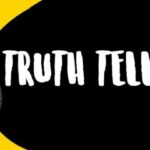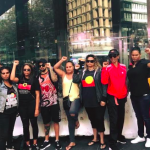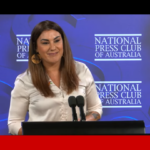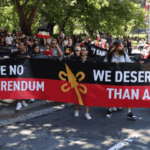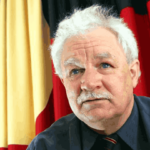It’s Always Been About Treaty: Senator Lidia Thorpe on the Progressive Vote
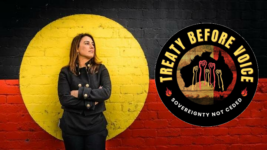
Not having bothered to pay attention to the Coalition’s No campaign as it makes its usual racist claims, this time about an all-powerful Voice to Parliament dividing the nation, hearing leader Peter Dutton’s use of the word “squalor” in relation to Aboriginal culture on television was still shocking.
This displayed a colonial settler mentality, which sees those that attempted genocide upon First Peoples, dispossessed them of their land and lives of plenty and placed them in camps and schools to be assimilated into the lower strata of a British system, blaming them for their imposed poverty.
As for the other side of the debate, the Yes campaign, prime minister Anthony Albanese never disappoints as he raises features of the Voice that highlight its lack of any recognition of Aboriginal sovereignty or any measures that will advance First Nations self-determination.
Instead, Albanese has underscored that the Voice is not about treaty. It will be subordinate to government. It will have no veto power, and what it can advise on will be prescribed by the executive. And this will not include questions regarding climate, defence or foreign affairs.
Whereas the Progressive vote has been the one to listen to in order to garner the truths beyond the spin.
These voices include Professor Gary Foley, Dr Chelsea Watego, Aboriginal Tent Embassy co-founder Ghillar Michael Anderson, Treaty Before Voice, the Black People’s Union and journalist Ben Abbatangelo.
But there has been no more prominent voice extolling the virtues of the Progressive vote during the debate than Senator Lidia Thorpe.
Sydney Criminal Lawyers spoke to the senator about the long history of the Blak Sovereign Movement, the fallacy of voice empowerment and the toll the campaign is taking.
About ten years ago, I engaged with the Redfern Aboriginal Tent Embassy and Grandmothers Against Removals and started to learn about land rights, sovereignty and that the stolen generations have never stopped.
Following that train of thought, I further learnt that constitutional recognition is a ruse to insert First Peoples into the founding document of the invaders because now it’s a bit inconvenient that they’re not included, especially when 32 percent of adult prisoners are Indigenous peoples.
And this critique continued as recognition morphed into the glossier version of the Voice.
So, I’m quite shocked that the highly politicised rights-forward-thinking First Nations people who’ve been calling this out for over a decade are now being suppressed or disparaged by the entire political spectrum in this country.
Lidia, how did this come to be? And how has it come this far?
It’s always been on the agenda. If we look at the history of how our people have been treated in this country since invasion – since colonisation – no government has ever made a law that has been good for us.
It’s part of the continuing genocide and oppressive regimes that the colonial power brings as part of their agenda of getting rid of us.
They didn’t kill us off. They couldn’t wipe us out. They couldn’t assimilate us in the timeframe they needed us to be assimilated into their colonial project. They didn’t conquer us.
So, this new proposal, which is really quite old and has just been dressed up to look pretty and make people feel nice, is part of this continued oppression and way of taking away the very essence of who we are as a people in this country: that belong to Country, that protects Country and who’ve never ceded their sovereignty.
This has always been on the cards. And there will be more.
The resistance of our people is a testament to this. We’ve been able to stay out of this dirty constitution since 1901. We have been able to maintain our sovereign status.
We have marched to that. We have marched for treaty, because we do want peace. We don’t want to continue to be part of this war on our land, waters, people, sky, air and totems.
We want peace and no government has been ready or willing to come to the table and talk about what peace looks like in this country with First Peoples.
They are afraid of us.
You’re representing the Blak Sovereign Movement. Prior to your announcement of that earlier this year, I would have described the train of thought we’re discussing as stemming from the Redfern Black Power Movement and the Aboriginal Tent Embassy that sprung from it.
But there was more going on around the nation at that time. In Naarm, this political movement included your uncle Robbie Thorpe.
So, how would you describe what the Blak Sovereign Movement is?
The Blak Sovereign Movement has always been here. It’s not new. It is made up of very respected grassroots activists, who have put their bodies on the line for decades.
We are continuing the legacy of our old people who resisted colonisation. And when we are talking about Blak Sovereign Movement, we are talking about loremen and lorewomen.
We are talking about academics. We are talking about elders. We are talking about young people.
We’re talking about clans and nations that maintain sovereignty over their land and waters. These peoples have been violated as sovereign people by all governments. It doesn’t matter what team you are playing for in parliament.
The Liberal, Labor and National parties have an intent to destroy us, and so, the sovereign movement will continue to fight.
And now we’re being attacked by our own people, because this Yes campaign is using language that you use in the church. If you listen to Pearson, he sounds like he’s a pastor in a church.
They’re coming out with this language that’s pulling at the heartstrings of the people and it’s violating the Sovereign Blacks that are fighting against this.
I’m driving past an “I’m Voting Yes” billboard with beautiful artwork on it, and I feel violated by that. It’s smoothing the dying pillow, that’s what I always got told about white fellas.
They’re feeling good about it. So, they will say yes. But really, they’re smoothing the dying pillow, because yes, as far as the minister for Indigenous affairs is concerned, is to a powerless advisory body that will focus on health, unemployment, education and housing.
Where is the justice in that? Where are deaths in custody, child removals, the destruction of land and climate change? You don’t think we’ve got something to say about that?
So, again, the oppressors are telling us what we can talk to them about. And the oppressors are coming back to us and saying, “We’ll give you a little advisory spot and we just may allow you to give advice.”
Well, I’m sorry. That is just not good enough. And after 250 years we do deserve better. We don’t have to go to a referendum for extra seats in parliament and we don’t have to go to a referendum for a treaty.
Millions of dollars are being thrown at the Yes campaign, when the Labor government right now has refused my recommendations and the recommendations from grassroots Aboriginal housing organisations to make sure that Aboriginal housing was a priority in the latest housing legislation.
But no, that was all too hard. Instead, I got whitesplained by the housing minister. When I said, “We’re still scraping elders off the street. I walked past an elder in WA with a walking frame at the bus stop that he was sleeping at.”
You know what she said to me? She said, “Well, you know, my family is connected to stolen generations, I understand. I know what this is like.”
I ended up walking out. I said, “How dare you whitesplain to me how you know what it’s like.”
Labor can talk the Voice all they like, but they won’t implement the recommendations of the deaths in custody inquiry.
They won’t recommend the child removal recommendations from the Bringing Them Home report. They won’t even give us any leeway on any legislation that’s going through parliament right now.
I’m begging them for housing for our people, and Burney is waiting for the Voice to come to talk about it. It is hypocrisy and it is deceitful, and it is wrong.
There is so much the parliament could do right now. They won’t pass the United Nations Declaration on the Rights of Indigenous People legislation, my private members bill. It’s been there for 18 months. They won’t do it.
This is what the public, hand on heart and going on a walk about it with Michael Long, are saying yes to. Well, why doesn’t it say yes to action now?
It’s so nasty out there that I am concerned about the health and wellbeing of my people. The government is creating a lot of hurt and harm in this country when it’s not necessary.
Well, talking about the impact of this debate, I would say that throughout this year you’ve shown enormous strength advancing the Progressive vote against such overwhelming pressure.
Paul, I’ve just moved back home after not being allowed home because someone wanted to kill me for four months. I had to give my fifteen-year-old to my sister because someone wanted to kill me.
I’ve come back to my home, and I have full protection all the time now. So, talk about doing it hard, people have no idea of how hard it has been.
Four months ago, I got a death threat while I was in parliament and the AFP took me to the airport, picked me up from the airport, drove me home and said I had 30 minutes to get all my stuff out of the house and I felt like I was escaping domestic violence again.
I was crying and packing my bags and I had to go and stay somewhere else for four months.
So, in considering that, it’s even more impressive that you’ve kept up this struggle against such opposition.
However, the Coalition continues to assert the voice will be so powerful it would divide the country, while Labor puts forth the promise of great change for First Peoples, despite Albanese highlighting its negative points as pluses when questioned about the impact of the Voice.
The Voice can’t order. It can only ask the same system that has dispossessed and perpetrated genocide upon all First Peoples to now do them a favour.
So, why is the majority white community arguing over the power of a powerless body? And do you think that the Voice recommendations will be treated with the same indifference those of the Royal Commission into Aboriginal deaths in custody have been?
Absolutely, the Voice has got no power. No power whatsoever and the government decides who is on it and what it looks like. It has no money. It has no mandate. It has no veto rights.
It is exemplary of what this country thinks of us. We are the problem that needs to be fixed.
“So, give the little Aborigines a voice, one with no power either way, as that’s what we prefer.” That’s what the Yes people are saying to me.
“We want you to have a seat in there somewhere, but you are not allowed to have any power, and we need to have parliamentary primacy over you at all times, because we don’t actually trust the Blacks in this country. And we know what’s best for you.”
The Aboriginal Tent Embassy has said it asserts absolute sovereignty and the right to self-determination and that the referendum council process was about restraining decolonisation and limiting self-determination.
So, it’s not taking part in the referendum as it has nothing to do with the law it abides by.
However, for you it’s different, you’re in parliament and you’re the face of the Progressive vote.
Some believe the consequences of a no vote will be insurmountable, others think it will bring about a reckoning where the true nature of so-called Australia is laid bare, while others are further worried about the nation having a South Africa moment, but it’s probably a little too late to worry about that.
So, why is it important to vote no in October and reject the Voice?
Because we need real power, and we need real justice in this country. It is time for treaty. It is time to end the war that was declared on our people.
We have not ceded sovereignty and we need to have a conversation in this country about sovereignty because the King of England says that he is sovereign to these lands. And he is not. He is not of this land.
So, let’s have a conversation about sovereignty through a peace treaty. And let’s talk about how we go into the Constitution. We cannot go into the Constitution until we have an agreement about consent and that can only happen through treaty.
We have to have a treaty first and foremost because clans and nations need to firstly self-determine their own destiny and have free, prior and informed consent about what that looks like.
That’s not going to take the time that all the Yes people are saying it would, because we know who we are: the clans and nations of this country. And we know our families and we can very quickly organise a conversation about what we want to end the war.
You’re hinting there at what I have experienced when I have said, “treaty before voice” to people, as some have replied, “Oh come on, how are we going to work that out”, as if it would be too complex a task.
But you’re saying it’s quite simple from where you stand.
And so, lastly, Lidia, in talking about treaty before voice, what are treaties going to provide? And how will they end the now-subtly-hidden war that you confirmed is ongoing during your National Press Club speech?
Well, the treaty has to be about peace. And it can’t be controlled by the oppressor. A treaty is an agreement between two parties that have been at war.
This treaty would be sovereign to sovereign, and it would be a negotiation about what clans and nations want on their own country.
We would have a national framework that would facilitate those conversations, and it could look a little bit like what Marcia and Tom did.
There is a lot of work that has already happened that we just need to play around with and bring into the context of treaty today.
I’m sure that the rest of the country, black fellas, would agree that the nonnegotiable would be you have to end deaths in custody – every recommendation has to be implemented.
You have to stop child removals. That is an act of genocide. This country is still guilty of genocide.
We have to stop destroying land. We know we need mining. Yes, we know that certain areas need to be destroyed. But those clans and nations need to be able to have veto power over certain areas that can never ever be destroyed, like songlines or the Juukan Gorge.
There are areas where we will allow mining. But it has to be a proper negotiation. And that’s what treaty can bring.
Treaty will bring climate justice. Treaty will facilitate and allow economic independence. We want our own economy.
We want to be able to make our own money on our own land, instead of all these mining companies ripping the heart out of our mother through the resources that they take and make billions and trillions of dollars out of, while our people are sleeping rough and hungry in the next town.
We want to economically empower ourselves through our own ways and through self-determining.
So, I believe treaty is not only a way that we can mature as a nation, but it will give our people a hand up and not a handout.
Treaty is good for everybody in this country. Let’s rewrite the Constitution through a treaty.
Let’s allow asylum seekers into our country without being tortured. Let’s stop building coal-fired power stations. I’m sure people would be open to that with a treaty.
Treaty is a blank canvas for this nation. It is what we make it. It comes from the people for the people.
So, if we’re going to alter the Constitution, let’s get rid of its racist elements and make sure that a new one looks after everyone in this country through treaty.
And the day that we celebrate won’t be the 26 January. It will be the day that we have a treaty.


